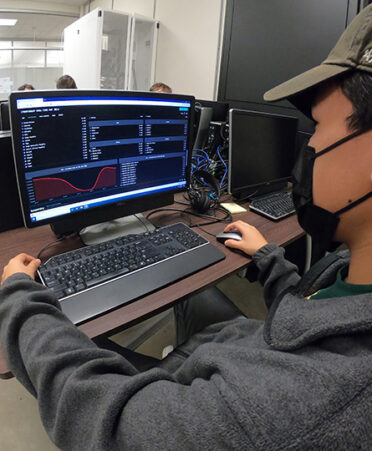(ROSENBERG, Texas) – When the ransomware attack on Colonial Pipeline made headlines earlier this year as the East Coast suffered a gas shortage, it was simply the latest and most visible example of an ongoing threat posed by hackers.
Other incidents have compromised the personal information and accounts of many, causing our nation’s leaders to grapple with the national threat such attacks pose.
“Helping us defend cybersecurity is everybody’s job,” said Alan Sulak, a Cybersecurity instructor at Texas State Technical College’s campus in Fort Bend County. “There are many jobs out there to take care of that.”
TSTC is training the next line of defenders in its Cybersecurity program.
The college offers an Associate of Applied Science degree in Cybersecurity, a Digital Forensics Specialist advanced technical certificate and a Basic Cybersecurity occupational skills award. All three pathways are fully online.
TSTC’s Cybersecurity program is also part of the college’s performance-based education modality. This means students can complete program milestones at a flexible pace.
“I think it takes students that are self-starters and have attention to detail because a lot of times, there’s much on-your-own research — not always a team effort,” Sulak said. “You’ve got to go find the bad guy. You’ve got to find what he did wrong in leaving evidence behind that you can use.”
Digital forensics analysts can earn an average annual salary of $89,750 in Texas, according to the U.S. Bureau of Labor Statistics. Onetonline.org finds that the potential for the number of such positions to increase is bright, forecasting 20% growth over the next seven years.
Sulak and his fellow TSTC Cybersecurity instructors teach students about the forensics aspect of the industry, gathering evidence in order to prosecute the hackers.
The instructors also make sure their students know how to communicate their findings.
“I heard from a student the other day that we taught him how to operate as a human in this industry,” Sulak said. “It’s not just the technical, it’s how to talk to people, how to teach business etiquette.”
When responding to online threats, it is critical that cybersecurity professionals can convey their findings to others.
“It’s one thing to find the solution,” Sulak said. “It’s another thing to write the solution where the rest of the world can understand it. Technical writing and business communications are really the top two things they’ve got to learn.”
Learn more about TSTC at tstc.edu.
